状语从句知识点总结(word)
- 格式:doc
- 大小:80.50 KB
- 文档页数:15
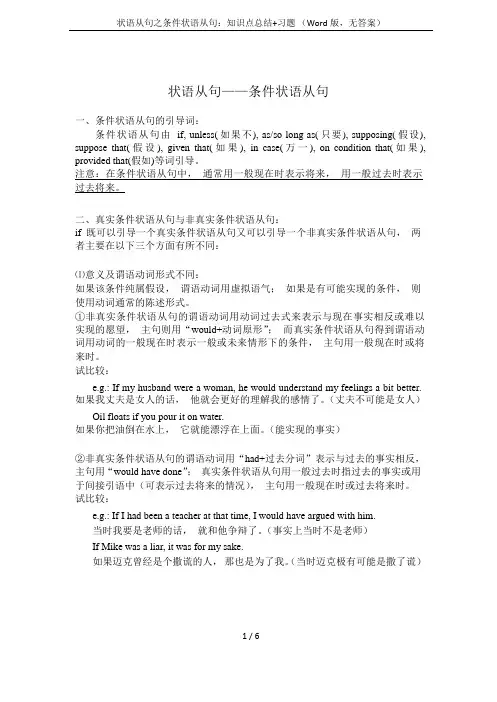
状语从句之条件状语从句:知识点总结+习题(Word版,无答案)状语从句——条件状语从句一、条件状语从句的引导词:条件状语从句由if, un le ss( 如果不), as/so long a s( 只要), suppos i ng( 假设), suppose that( 假设), given that( 如果), in case( 万一), on condition that( 如果), provided that(假如)等词引导。
注意:在条件状语从句中,通常用一般现在时表示将来,用一般过去时表示过去将来。
二、真实条件状语从句与非真实条件状语从句:if 既可以引导一个真实条件状语从句又可以引导一个非真实条件状语从句,两者主要在以下三个方面有所不同:⑴意义及谓语动词形式不同:如果该条件纯属假设,谓语动词用虚拟语气;如果是有可能实现的条件,则使用动词通常的陈述形式。
①非真实条件状语从句的谓语动词用动词过去式来表示与现在事实相反或难以实现的愿望,主句则用“would+动词原形”;而真实条件状语从句得到谓语动词用动词的一般现在时表示一般或未来情形下的条件,主句用一般现在时或将来时。
试比较:e.g.: If my husband were a woman, he would understand my feelings a bit better. 如果我丈夫是女人的话,他就会更好的理解我的感情了。
(丈夫不可能是女人)Oil floats if you pour it on water.如果你把油倒在水上,它就能漂浮在上面。
(能实现的事实)②非真实条件状语从句的谓语动词用“had+过去分词”表示与过去的事实相反,主句用“would have done”;真实条件状语从句用一般过去时指过去的事实或用于间接引语中(可表示过去将来的情况),主句用一般现在时或过去将来时。
试比较:e.g.: If I had been a teacher at that time, I would have argued with him.当时我要是老师的话,就和他争辩了。
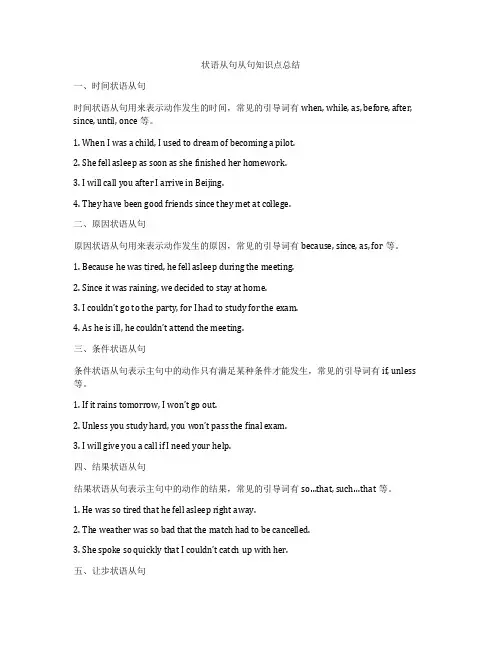
状语从句从句知识点总结一、时间状语从句时间状语从句用来表示动作发生的时间,常见的引导词有when, while, as, before, after, since, until, once等。
1. When I was a child, I used to dream of becoming a pilot.2. She fell asleep as soon as she finished her homework.3. I will call you after I arrive in Beijing.4. They have been good friends since they met at college.二、原因状语从句原因状语从句用来表示动作发生的原因,常见的引导词有because, since, as, for等。
1. Because he was tired, he fell asleep during the meeting.2. Since it was raining, we decided to stay at home.3. I couldn’t go to the party, for I had to study for the exam.4. As he is ill, he couldn’t attend the meeting.三、条件状语从句条件状语从句表示主句中的动作只有满足某种条件才能发生,常见的引导词有if, unless 等。
1. If it rains tomorrow, I won’t go out.2. Unless you study hard, you won’t pass the final exam.3. I will give you a call if I need your help.四、结果状语从句结果状语从句表示主句中的动作的结果,常见的引导词有so…that, such…that等。
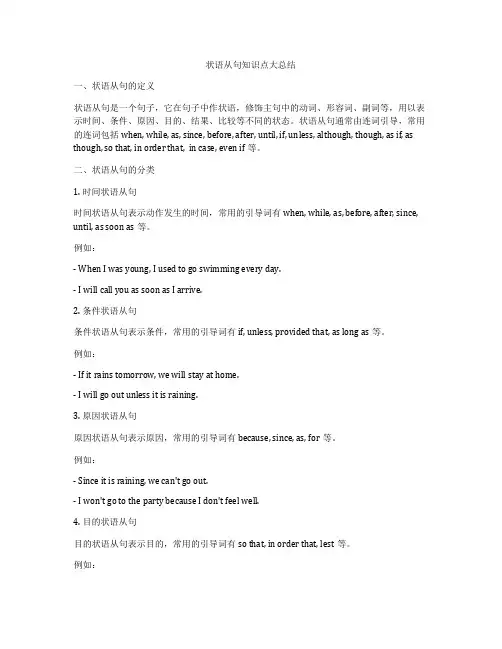
状语从句知识点大总结一、状语从句的定义状语从句是一个句子,它在句子中作状语,修饰主句中的动词、形容词、副词等,用以表示时间、条件、原因、目的、结果、比较等不同的状态。
状语从句通常由连词引导,常用的连词包括when, while, as, since, before, after, until, if, unless, although, though, as if, as though, so that, in order that, in case, even if等。
二、状语从句的分类1. 时间状语从句时间状语从句表示动作发生的时间,常用的引导词有when, while, as, before, after, since, until, as soon as等。
例如:- When I was young, I used to go swimming every day.- I will call you as soon as I arrive.2. 条件状语从句条件状语从句表示条件,常用的引导词有if, unless, provided that, as long as等。
例如:- If it rains tomorrow, we will stay at home.- I will go out unless it is raining.3. 原因状语从句原因状语从句表示原因,常用的引导词有because, since, as, for等。
例如:- Since it is raining, we can't go out.- I won't go to the party because I don't feel well.4. 目的状语从句目的状语从句表示目的,常用的引导词有so that, in order that, lest等。
例如:- I study hard so that I can get a good job.- We left early in order that we might avoid the traffic.5. 结果状语从句结果状语从句表示结果,常用的引导词有so...that, such...that等。
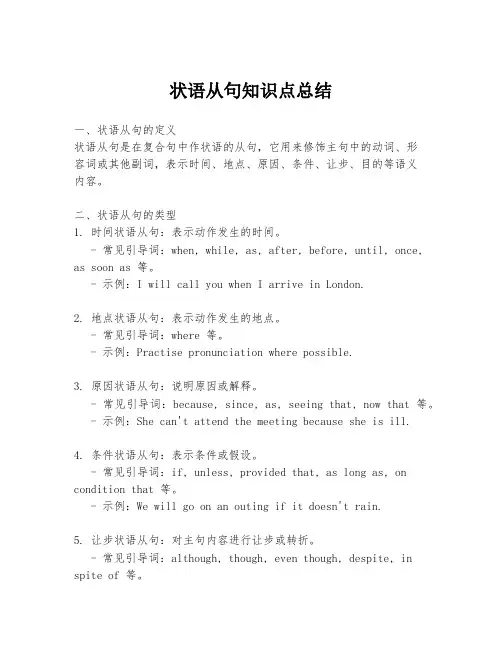
状语从句知识点总结一、状语从句的定义状语从句是在复合句中作状语的从句,它用来修饰主句中的动词、形容词或其他副词,表示时间、地点、原因、条件、让步、目的等语义内容。
二、状语从句的类型1. 时间状语从句:表示动作发生的时间。
- 常见引导词:when, while, as, after, before, until, once, as soon as 等。
- 示例:I will call you when I arrive in London.2. 地点状语从句:表示动作发生的地点。
- 常见引导词:where 等。
- 示例:Practise pronunciation where possible.3. 原因状语从句:说明原因或解释。
- 常见引导词:because, since, as, seeing that, now that 等。
- 示例:She can't attend the meeting because she is ill.4. 条件状语从句:表示条件或假设。
- 常见引导词:if, unless, provided that, as long as, on condition that 等。
- 示例:We will go on an outing if it doesn't rain.5. 让步状语从句:对主句内容进行让步或转折。
- 常见引导词:although, though, even though, despite, in spite of 等。
- 示例:Despite the bad weather, we went for a walk.6. 目的状语从句:表示目的。
- 常见引导词:so that, in order that 等。
- 示例:He gets up early so that he can catch the first bus.7. 结果状语从句:表示结果。
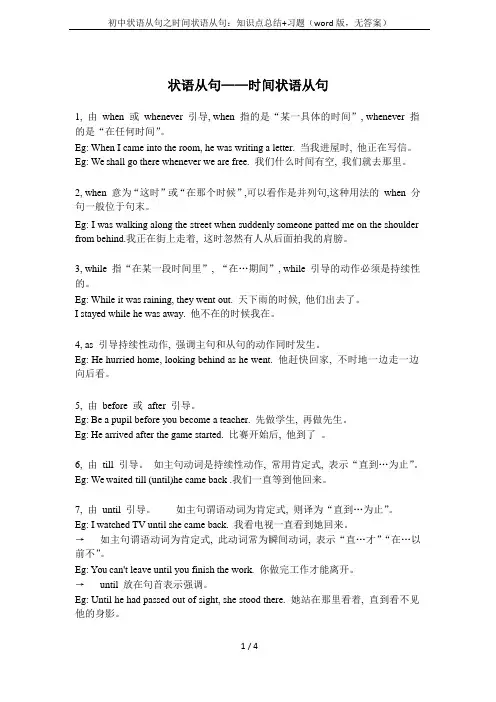
初中状语从句之时间状语从句:知识点总结+习题(word版,无答案)状语从句——时间状语从句1, 由when 或whenever 引导, when 指的是“某一具体的时间”, whenever 指的是“在任何时间”。
Eg: When I came into the room, he was writing a letter. 当我进屋时, 他正在写信。
Eg: We shall go there whenever we are free. 我们什么时间有空, 我们就去那里。
2, when 意为“这时”或“在那个时候”,可以看作是并列句,这种用法的when 分句一般位于句末。
Eg: I was walking along the street when suddenly someone patted me on the shoulder from behind.我正在街上走着, 这时忽然有人从后面拍我的肩膀。
3, while 指“在某一段时间里”, “在…期间”, while 引导的动作必须是持续性的。
Eg: While it was raining, they went out. 天下雨的时候, 他们出去了。
I stayed while he was away. 他不在的时候我在。
4, as 引导持续性动作, 强调主句和从句的动作同时发生。
Eg: He hurried home, looking behind as he went. 他赶快回家, 不时地一边走一边向后看。
5, 由before 或after 引导。
Eg: Be a pupil before you become a teacher. 先做学生, 再做先生。
Eg: He arrived after the game started. 比赛开始后, 他到了。
6, 由till 引导。
如主句动词是持续性动作, 常用肯定式, 表示“直到…为止”。
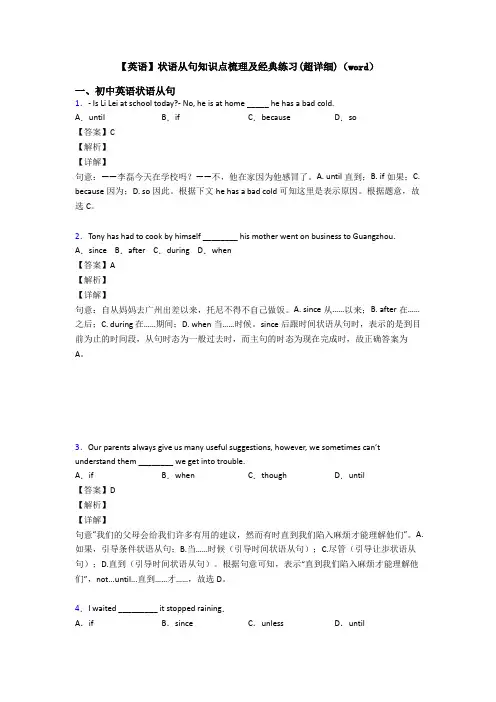
【英语】状语从句知识点梳理及经典练习(超详细)(word)一、初中英语状语从句1.- Is Li Lei at school today?- No, he is at home _____ he has a bad cold.A.until B.if C.because D.so【答案】C【解析】【详解】句意:——李磊今天在学校吗?——不,他在家因为他感冒了。
A. until直到;B. if如果;C. because因为;D. so因此。
根据下文he has a bad cold可知这里是表示原因。
根据题意,故选C。
2.Tony has had to cook by himself ________ his mother went on business to Guangzhou. A.since B.after C.during D.when【答案】A【解析】【详解】句意:自从妈妈去广州出差以来,托尼不得不自己做饭。
A. since从……以来;B. after在……之后;C. during 在……期间;D. when当……时候。
since后跟时间状语从句时,表示的是到目前为止的时间段,从句时态为一般过去时,而主句的时态为现在完成时,故正确答案为A。
3.Our parents always give us many useful suggestions, however, we sometimes can’t understand them ________ we get into trouble.A.if B.when C.though D.until【答案】D【解析】【详解】句意“我们的父母会给我们许多有用的建议,然而有时直到我们陷入麻烦才能理解他们”。
A.如果,引导条件状语从句;B.当……时候(引导时间状语从句);C.尽管(引导让步状语从句);D.直到(引导时间状语从句)。
根据句意可知,表示“直到我们陷入麻烦才能理解他们”,not...until...直到……才……,故选D。
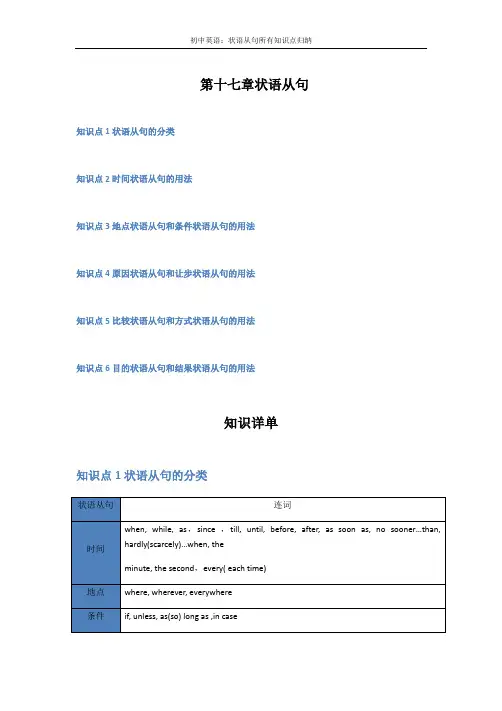
第十七章状语从句知识点1状语从句的分类知识点2时间状语从句的用法知识点3地点状语从句和条件状语从句的用法知识点4原因状语从句和让步状语从句的用法知识点5比较状语从句和方式状语从句的用法知识点6目的状语从句和结果状语从句的用法知识详单知识点1状语从句的分类知识点2时间状语从句的用法知识点3地点状语从句和条件状语从句的用法知识点4原因状语从句和让步状语从句的用法知识点5比较状语从句和方式状语从句的用法知识点6目的状语从句和结果状语从句的用法考点突破考点1考查时间状语从句的用法1.(龙东中考)-Henry, please call us as soon as you _______ Hawaii.-OK. I'll do that, Mom.A. arrive inB. are arriving inC. will arrive at【解析】选择A as soon as结构意为“一……就……,”引导时间状讲从句,主句为祈使句,从句用一般现在时表示将来。
Hawaii 为大地点.因此用in.考点2考查地点状语从句的用法2.(扬州中考)-My friend has achieved his goal after years of hard work.--- Great.A·One tree can make a forest B. Where there is a will,there is a way C. Many hands make light work D. A friend in need is a friend indeed【解析】选B 第一个人阐述自己的朋友经过多年努力实现目标.,第二个人表示祝贺,同时,发表自己对此事的看法。
应该是“有志者,事竟成”.该句是where引导的地点状语从句。
考点3考查条件状语从句的用法3.(十堰中考)_________ deal with our problems, we can easily become unhappy.A. UntilB. IfC. UnlessD. Though【解析】选C。
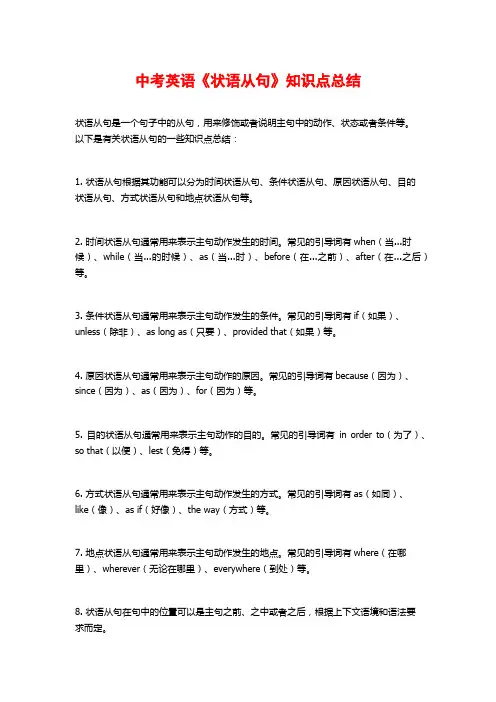
中考英语《状语从句》知识点总结状语从句是一个句子中的从句,用来修饰或者说明主句中的动作、状态或者条件等。
以下是有关状语从句的一些知识点总结:1. 状语从句根据其功能可以分为时间状语从句、条件状语从句、原因状语从句、目的状语从句、方式状语从句和地点状语从句等。
2. 时间状语从句通常用来表示主句动作发生的时间。
常见的引导词有when(当...时候)、while(当...的时候)、as(当...时)、before(在...之前)、after(在...之后)等。
3. 条件状语从句通常用来表示主句动作发生的条件。
常见的引导词有if(如果)、unless(除非)、as long as(只要)、provided that(如果)等。
4. 原因状语从句通常用来表示主句动作的原因。
常见的引导词有because(因为)、since(因为)、as(因为)、for(因为)等。
5. 目的状语从句通常用来表示主句动作的目的。
常见的引导词有in order to(为了)、so that(以便)、lest(免得)等。
6. 方式状语从句通常用来表示主句动作发生的方式。
常见的引导词有as(如同)、like(像)、as if(好像)、the way(方式)等。
7. 地点状语从句通常用来表示主句动作发生的地点。
常见的引导词有where(在哪里)、wherever(无论在哪里)、everywhere(到处)等。
8. 状语从句在句中的位置可以是主句之前、之中或者之后,根据上下文语境和语法要求而定。
9. 引导状语从句的引导词(连词)一般只有一个,不同的引导词具有不同的语法功能和用法规则。
10. 状语从句与主句之间存在着时态、语序和语气的一致性。
如主将从现、主过从过、主现从现等。
以上是对中考英语《状语从句》知识点的简要总结,希望对你有所帮助!。
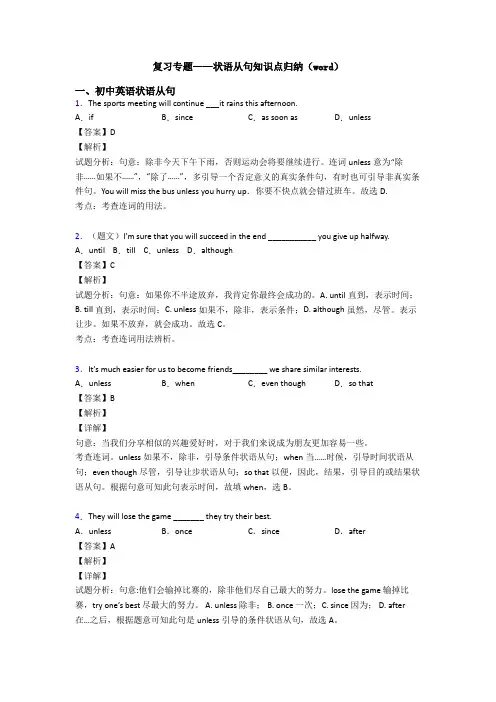
复习专题——状语从句知识点归纳(word)一、初中英语状语从句1.The sports meeting will continue ___it rains this afternoon.A.if B.since C.as soon as D.unless【答案】D【解析】试题分析:句意:除非今天下午下雨,否则运动会将要继续进行。
连词unless意为“除非……如果不……”,“除了……”,多引导一个否定意义的真实条件句,有时也可引导非真实条件句。
You will miss the bus unless you hurry up.你要不快点就会错过班车。
故选D.考点:考查连词的用法。
2.(题文)I’m sure that you will succeed in the end ___________ you give up halfway. A.until B.till C.unless D.although【答案】C【解析】试题分析:句意:如果你不半途放弃,我肯定你最终会成功的。
A. until直到,表示时间;B. till 直到,表示时间;C. unless如果不,除非,表示条件;D. although虽然,尽管。
表示让步。
如果不放弃,就会成功。
故选C。
考点:考查连词用法辨析。
3.It’s much easier for us to become friends________ we share similar interests.A.unless B.when C.even though D.so that【答案】B【解析】【详解】句意:当我们分享相似的兴趣爱好时,对于我们来说成为朋友更加容易一些。
考查连词。
unless如果不,除非,引导条件状语从句;when当……时候,引导时间状语从句;even though尽管,引导让步状语从句;so that以便,因此,结果,引导目的或结果状语从句。
根据句意可知此句表示时间,故填when,选B。
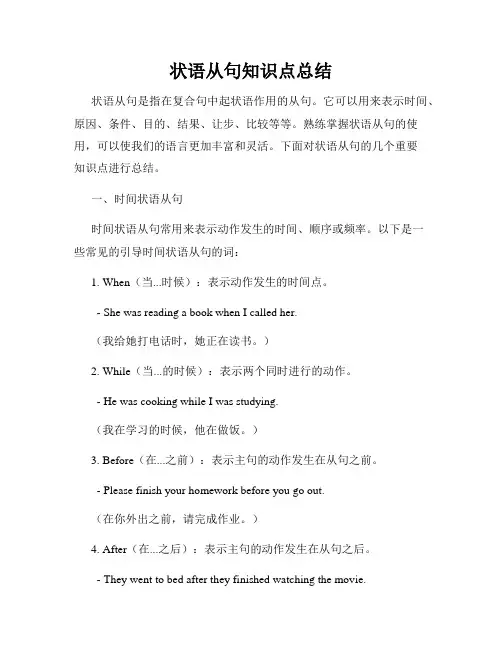
状语从句知识点总结状语从句是指在复合句中起状语作用的从句。
它可以用来表示时间、原因、条件、目的、结果、让步、比较等等。
熟练掌握状语从句的使用,可以使我们的语言更加丰富和灵活。
下面对状语从句的几个重要知识点进行总结。
一、时间状语从句时间状语从句常用来表示动作发生的时间、顺序或频率。
以下是一些常见的引导时间状语从句的词:1. When(当...时候):表示动作发生的时间点。
- She was reading a book when I called her.(我给她打电话时,她正在读书。
)2. While(当...的时候):表示两个同时进行的动作。
- He was cooking while I was studying.(我在学习的时候,他在做饭。
)3. Before(在...之前):表示主句的动作发生在从句之前。
- Please finish your homework before you go out.(在你外出之前,请完成作业。
)4. After(在...之后):表示主句的动作发生在从句之后。
- They went to bed after they finished watching the movie.(他们在看完电影之后就去睡觉了。
)二、原因状语从句原因状语从句常用来表示某个动作的原因或理由。
以下是一些常见的引导原因状语从句的词:1. Because(因为):表示直接的原因。
- I didn't go to the party because I was tired.(我因为累所以没有参加聚会。
)2. Since(因为):表示已知的事实或理由。
- He was absent from work since he was not feeling well.(他因病缺勤了。
)3. As(因为):表示两个动作同时发生,前者是后者发生的原因。
- I couldn't hear the speaker as the music was too loud.(由于音乐声音太大,我听不到演讲者的声音。
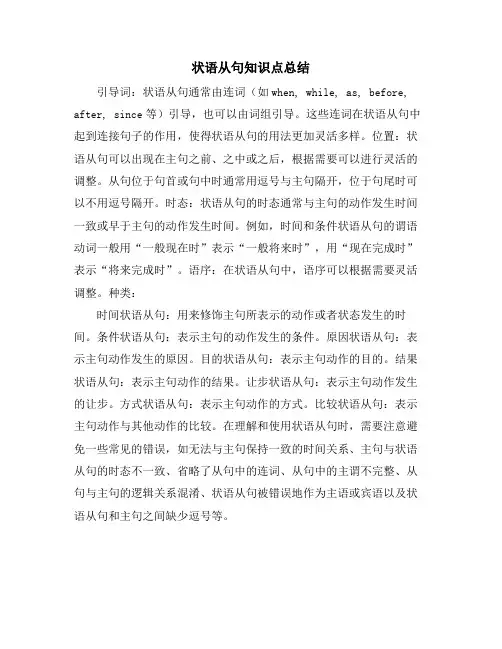
状语从句知识点总结
引导词:状语从句通常由连词(如when, while, as, before, after, since等)引导,也可以由词组引导。
这些连词在状语从句中起到连接句子的作用,使得状语从句的用法更加灵活多样。
位置:状语从句可以出现在主句之前、之中或之后,根据需要可以进行灵活的调整。
从句位于句首或句中时通常用逗号与主句隔开,位于句尾时可以不用逗号隔开。
时态:状语从句的时态通常与主句的动作发生时间一致或早于主句的动作发生时间。
例如,时间和条件状语从句的谓语动词一般用“一般现在时”表示“一般将来时”,用“现在完成时”表示“将来完成时”。
语序:在状语从句中,语序可以根据需要灵活调整。
种类:
时间状语从句:用来修饰主句所表示的动作或者状态发生的时间。
条件状语从句:表示主句的动作发生的条件。
原因状语从句:表示主句动作发生的原因。
目的状语从句:表示主句动作的目的。
结果状语从句:表示主句动作的结果。
让步状语从句:表示主句动作发生的让步。
方式状语从句:表示主句动作的方式。
比较状语从句:表示主句动作与其他动作的比较。
在理解和使用状语从句时,需要注意避免一些常见的错误,如无法与主句保持一致的时间关系、主句与状语从句的时态不一致、省略了从句中的连词、从句中的主谓不完整、从句与主句的逻辑关系混淆、状语从句被错误地作为主语或宾语以及状语从句和主句之间缺少逗号等。
总之,状语从句的使用可以丰富句子的结构,使文章更加丰富多样。
掌握状语从句的引导词、位置、时态、语序以及种类等知识点,对于提高英语写作能力具有重要意义。
【英语】状语从句知识点(大全)(word)一、初中英语状语从句1.— What do you think of your junior middle school life?— I think it is colorful, I’m always busy.A.though B.while C.until D.because【答案】A【解析】【详解】本题考查:副词辨析。
选项分析:A. though虽然,尽管。
B. while虽然;然而。
C. until 在…以前;直到…时。
D. because因为。
综合分析前后句,可知此处填 though最合适,完整句意为:— What do you think of your junior middle school life?你觉得你的初中生活怎么样?—I think it is colorful, though I’m always busy.我认为它是丰富多彩的,虽然我总是很忙。
正确答案为:A2.The Italian woman didn’t feel a culture shock____it was her fi rst time to Shanghai. A.though B.since C.if D.when【答案】A【解析】句意:这个意大利妇女没有感到一种文化冲击,尽管她是第一次来上海。
A. though尽管;B. since自从;C. if 是否,如果;D. when当---时候;根据The Italian woman didn’t feel a culture shock这个意大利妇女没有感到一种文化冲击,和it was her first time to Shanghai.她是第一次来上海之间用though 引导让步关系状语从句;故选A3.You will lose the ability to pay attention, plan and stay active after one or two nights _____ you can sleep well.A.until B.when C.unless D.if【答案】C【解析】【详解】句意:除非你能睡好,否则一两个晚上之后你会失去关注、计划和保持活力的能力。
状语从句之让步状语从句:知识点总结+习题(Word版,无答案)让步状语从句一、引导让步状语从句的连词有although, though, as, even if, even though, while,whether...or...,whether(...) or not, whatever, no matter what/ how/ why 等。
1. though/although 引导的让步状语从句1)although 和though 意义相同,都意为“虽然,即使”,表示让步,一般情况下可互换使用,区别在于although 语气较重,大多置于句首。
2)though/ although 引导让步状语从句时,主句若用yet 或still 引出,更加强调对比性,但不可出现but。
3)though 引导的从句可以把表语、状语、动词等提至句首。
在as though, even though 中一般不可用although 代替。
同时although 不可当副词用,而though 则可。
Although it's raining, they are still working in the field.虽然在下雨,但他们仍在地里干活。
Short though it is, the article is very important.那篇文章虽然很短,但很重要。
注意:though 还可用作副词,意为“可是,然而”,置于句末。
He said he would come; he didn't, though.他说他会来,可是没有来。
2. even though/ even if 引导的让步状语从句这两个短语表示语气更强的让步,常常意为“再退一步说”。
even though 更强调对“既成事实” 的让步:Even though he is poor, she loves him. (= He is poor, yet she loves him.)尽管他很穷,但她还是爱他。
状语从句知识点总结详细状语从句是英语语法中一个重要的概念,它指的是在句子中起修饰或说明作用的从句,通常用来描述主句中的动作或状态的时间、地点、方式、原因、条件等。
以下是关于状语从句的详细知识点总结:一、时间状语从句:时间状语从句通常由when、while、before、after等引导词引导,表示主句动作发生的时间。
例如:When the rain stopped,we went out for a walk.(当雨停了,我们出去散步。
)While I was studying,my roommate was watching TV.(当我在学习时,我的室友在看电视。
)二、地点状语从句:地点状语从句通常由where、wherever等引导词引导,表示主句动作发生的地点。
例如:Go where you like.(去你喜欢的地方。
)Wherever you go,I will follow you.(无论你去哪里,我都会跟着你。
)三、方式状语从句:方式状语从句通常由as、as if、as though等引导词引导,表示主句动作进行的方式或状态。
例如:She acts as if she were the boss.(她表现得好像她是老板。
)He talks as though he knew everything.(他说话好像他知道一切。
)四、原因状语从句:原因状语从句通常由because、since、as等引导词引导,表示主句动作发生的原因。
例如:I didn't go to the party because I was tired.(我没去参加派对,因为我累了。
)Since you are here,you can help us.(既然你在这里,你可以帮助我们。
)五、条件状语从句:条件状语从句通常由if、unless等引导词引导,表示主句动作发生的条件。
例如:If you study hard,you will pass the exam.(如果你努力学习,你会通过考试。
状语从句知识点【原创实用版】目录一、什么是状语从句二、状语从句的分类1.时间状语从句2.地点状语从句3.原因状语从句4.结果状语从句5.目的状语从句6.条件状语从句三、状语从句的用法和特点四、总结正文一、什么是状语从句状语从句是指在主从复合句中用作状语的从句。
状语从句通常用来修饰主句中的动词、形容词、副词或整个句子,表示时间、地点、原因、结果、目的或条件等概念。
二、状语从句的分类1.时间状语从句:用来表示动作发生的时间,如 when、while、since、after 等引导词。
例如:When I reached the park, they were already playing football.2.地点状语从句:用来表示动作发生的地点,如 where、in which 等引导词。
例如:This is the place where we met last time.3.原因状语从句:用来表示动作发生的原因,如 because、since、as 等引导词。
例如:I am late because of the traffic.4.结果状语从句:用来表示动作产生的结果,如 so、such、that 等引导词。
例如:She is so beautiful that everyone stares at her.5.目的状语从句:用来表示动作的目的,如 to、in order to、so as to 等引导词。
例如:I studied hard to pass the exam.6.条件状语从句:用来表示动作发生的条件,如 if、unless、provided that 等引导词。
例如:I will lend you the book if you return it next week.三、状语从句的用法和特点状语从句通常由连词、副词或代词引导,其主语和谓语与主句保持一致。
状语从句的位置灵活,可以根据需要放在主句之前、之后或中间。
状语从句知识点总结英语一、基本概念1. 状语从句是一个从句,不能独立成句,必须依附于主句,起到修饰主句的作用。
2. 状语从句常常用来表示时间、原因、条件、目的、方式、比较等信息,以补充说明主句的情况。
3. 状语从句通常由连词引导,如when, while, before, after, since, because, if, unless, in order that, so that, as if, as though等。
二、结构1. 时间状语从句当表示时间的状语从句出现在主句之前时,从句中的连词一般是when,while,before,after,as,since等。
例如:When I was young, I used to play basketball every day.当表示时间的状语从句出现在主句之后时,从句中的连词一般是before,after,since,as soon as等。
例如:I will call you after I finish my work.2. 原因状语从句表示原因的状语从句通常由because,since,as,for等引导。
例如:As it was raining, we decided to stay at home.特别需要注意的是,由于as和since还可以引导时间状语从句,因此在使用时要根据具体语境确定其含义。
3. 条件状语从句条件状语从句是表示条件的从句,通常由if,unless,on condition that等引导。
例如:If it rains tomorrow, we will cancel the trip.需要特别注意的是,在条件状语从句中,如果主句是将来时态,从句可以使用一般现在时来表示将来的情况。
4. 目的状语从句目的状语从句表示主句的目的或打算,通常由in order that, so that等引导。
例如:We woke up early so that we could catch the first train.5. 方式状语从句方式状语从句表示主句的动作是如何完成的,通常由as if,as though,as,just as等引导。
史上最全状语从句知识点总结,建议收藏!状语从句在句中相当于副词,做状语,又叫副词性从句。
状语从句分为九类,包括时间状语从句、条件状语从句、地点状语从句、原因状语从句、目的状语从句、让步状语从句、结果状语从句、方式状语从句和比较状语从句。
1. 时间状语从句⑴当......的时候:when,as,whileI fell asleep when/as/while he was doing his exercises .他正作练习时我睡着了。
When he arrived in Shanghai ,his mother met him at the station .他到上海时,他妈妈到车站接他。
While John was watching TV,his wife was cooking.当约翰看电视的时候,他的妈妈在做饭。
She always sings as she walks .她总是一边走一边唱。
注意:when 引导的时间状语从句中的谓语动词可以是持续的也可以是瞬时的;while和as 引导的时间状语从句中的谓语动词必须是持续的。
⑵一......就......:as soon as,the minute,the moment,the instant,immediately ,directly,instantly,no sooner … than...,hardly …when...,scarcely…when...The children ran away from the orchard(果园) the moment they saw the guard.孩子们一看到守卫就从果园跑掉了。
No sooner had I arrived home than it began to rain.我一到家天就开始下雨。
⑶直到...... till,until,not...until...(直到......才......,not翻译成“才”)I didn’t realize how special my mother was until I became an adult.直到我长大成人,我才意识到我的妈妈是多么特别。